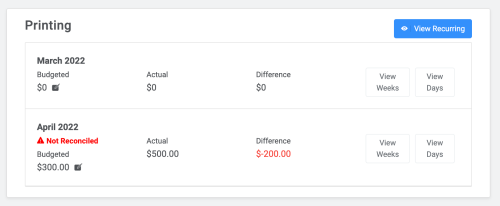Why Reconcile?
No matter how diligent of a budgeter you are, accurately predicting what you are going to spend will be a very difficult task. This is why one of the core best practices of campaign budgeting is to regularly reconcile your budget. What does that mean? Reconciling is the act of analyzing and then matching what you have budgeted to what you actually spent from the first day of your budget to present day.
Let’s say your volunteers knocked on way more doors than you expected last month. The in-house literature printing budget of $300 ballooned to $500. When updating your budget you will first change your past budgeted amount from $300 to $500 so your projections reconcile with your actual amount. And then – armed with this new data point – you’ll ask yourself if you need to increase your projections moving forward. If this was an isolated incident, you may stick with $300 for the foreseeable future. If this level of volunteer engagement is the new normal, you may need to increase this line item.
Many who are new to the world of campaign budgeting are hesitant to reconcile their past projections. They want to refer to original projections, but this thinking can be flawed. Our campaign budget is a living breathing document that requires frequent changes. You can always create a copy at the beginning of a campaign or right before an important date, and refer back to this copy and compare that to your actuals in the future.
We often say the trick to being a great budgeter is doing it… frequently. To be a good campaign budgeter, you should set aside time to review and reconcile your budget on a regular basis. We recommend at least weekly, though definitely daily as you approach election day. This will save you valuable time and from making costly mistakes.
Reconciling also makes your cash on hand and budget gap as accurate as possible. You want to be equipped with the best information when making those strategic, and sometimes difficult, spending decisions. If you are confident in the accuracy of your budget gap then you can create a path forward to closing that gap.

Here at Warchest we think reconciling is so important that we created its own alert. (You won’t see a spreadsheet do that!) But why is this practice so crucial?
To depict why reconciliation is so important, we will look at three different scenarios that you are sure to encounter in your budgeting journey:
- Under and overspending
- Early and late spending
- Recurring expenses/overhead
